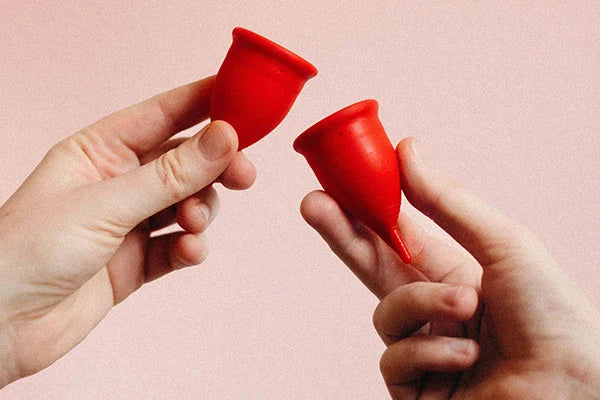
Questions like ‘when is a period considered late or missed?’ can be quite common, but still create a great deal of anxiety when you don’t have the answers. The menstrual cycle can be a great indicator of general health, so it’s important to pay attention to the clues your body is giving you. At VUSH, we have decided to try and help alleviate some of this anxiety and provide some clarity by breaking down all the possible reasons for a late or missed period.
Regular Cycle VS Irregular Cycle
Generally, people who don’t have any known health conditions impacting their menstrual cycle will start their period around 21 to 35-40 days after their last period. There is no ‘normal’ way that this should occur, though. Each cycle is as different as the individual, whether this involves slightly longer or shorter cycles or more persistent symptoms.
That said, a regular cycle is considered to be around 28 days in length. Slight variations should not be an immediate cause for concern as there are many reasons a period might be late.
Is my period late or missed?
With the above information in mind, it is important to remember that a healthy menstrual cycle can range from every 21 to 35-40 days. Understanding when your period can be considered ‘late’ or ‘missed’ within your typical cycle will assist with your mental and physical health, so if you are worried, it helps to know what to look out for.
Late Period
A period is generally considered late if it has not started within a week of when you expect it. Unless you have a condition already diagnosed that causes irregular cycles, you should be able to gauge a rough idea of your expected period dates. Using a period tracking app can help with this if you’re not sure. Remember, there are four different phases of the menstrual cycle, and understanding these can help you track your cycle better.
Missed Period
If you have not bled after six weeks, you can treat your late period as missed. Naturally, pregnancy is often thought to be the only cause, but most people will actually experience a missed period unrelated to a new child a few times in their lives – so this is not an immediate reason to stress!
What are the possible reasons for a late or missed period?
If you are wondering what commonly causes late or missed periods, you have come to the right place! There are actually many reasons behind irregular cycles, and we have compiled some of the more likely causes you should know:
Stress
Stress is one of the most prevalent reasons for late or missed periods. When stressed, your brain sends messages to your endocrine system to release fight-or-flight hormones1, preparing for the worst. These hormones can suppress your reproductive system and therefore disrupt your period and cycle. If your body is under stress, it won’t prioritise making a baby, which is the main function of the menstrual cycle (whether that’s your goal or not). It’s extremely common for the menstrual cycle to be impacted by stress.
Hormonal birth control
If you take the pill, you are likely already aware that it can be one of the main reasons for a late or missed period. Known for making a cycle regular, hormonal birth control can also disrupt your cycle, particularly during the first few months or when you stop taking it, given how the body attempts to return to its baseline levels. The body needs time to adjust to hormonal birth control and any related changes, whether you’ve just started new birth control, have been using it for a while, or have just gone off it.
Weight loss or gain
A sudden change to your body, like excess weight loss or gain, can also cause irregular cycles by contributing to a hormone imbalance in the body. Weight gain can alter oestrogen levels within the body, affecting the cycle. When you are calorie deprived, this affects your brain and influences your period, causing what is considered to be a late or missed period. Lack of body fat due to weight loss can also impact the cycle.
High workout intensity
This is also why professional athletes sometimes lose their periods during their peak training season, as exercising for several hours each day may also lead to disruptions in their menstrual cycle. When you burn more calories than you consume, your body does not have the energy available to keep your bodily systems functioning as usual. As a result, hormones become imbalanced, which may affect menstruation. As such, it is crucial to introduce a suitable diet to match your training regime! You can read more about diet, exercise and the menstrual cycle on our blog.
Perimenopause
Perimenopause refers to the time leading up to the transition into menopause. Many people entering their late 40s may experience multiple late or missed periods for several years during this perimenopausal phase. This is again due to changing hormonal balances throughout the body.
Early menopause
Early menopause occurs when the ovaries stop producing hormones like estrogen. When these levels drop, symptoms of menopause will occur – one of these symptoms being a disruption in your menstrual cycle and a late or missed period. Menopause represents the end of the menstrual cycle, so this could mean the end of your period all together!
PCOS
Polycystic Ovary Syndrome (PCOS) is a hormonal condition that can affect the menstrual cycle. If someone has PCOS and an irregular menstrual cycle, then the individual may not ovulate regularly and may require certain medications or supplements to support better hormone production. It is common for people with PCOS to have late or missed periods.
Chronic condition
Diseases like diabetes or celiac disease can directly impact your menstrual cycle, causing what is considered a late or missed period. The changes in blood sugar are linked with hormonal changes in the body, which can cause your period to be irregular. On top of PCOS, other chronic conditions such as endometriosis or adenomyosis can also impact your menstrual cycle more directly.
Thyroid condition
Thyroid conditions are one of the many reasons for a late or missed period. The thyroid regulates metabolism, so if it is overactive or underactive, this may be evident in your hormone levels and menstrual cycle. Working with a doctor or naturopath on your thyroid issues may help regulate your menstrual cycle.
Pregnant
As mentioned above, pregnancy is perhaps the most well-known of the reasons for a late or missed period. This is due to the continued production of progesterone in the body to support a pregnancy which prevents the onset of future periods while the foetus grows. It can feel confusing to work out whether any symptoms you may be experiencing are related to your period coming or pregnancy. Read up on PMS vs pregnancy symptoms, here.

When to see a doctor
It goes without saying that if you are worried about any of the reasons above that might cause a late or missed period, always check with your healthcare provider. It’s better to be safe, and a quick visit to your GP may help to alleviate any concerns or anxiety.
There are certain signs to look out for that may indicate something is impacting your cycle. If you experience any of these symptoms, contact your doctor immediately:
- Unusually heavy bleeding
- Bleeding that lasts more than seven days
- Severe pain
- Nausea and vomiting
- Fever
- Bleeding after the onset of menopause and an absence of periods for over a year
Read more on Wellness:
A greater understanding of your body and how it works will help you to achieve a greater level of wellness and peace of mind. A late or missed period, for example, often causes great anxiety, but if you are well-informed, you can take the best action for your wellbeing.
If you are interested in learning more about wider wellness with VUSH, check out any of the interesting reads in our blog. We cover a range of topics, from learning how to relieve endometriosis pain to better understanding the four stages of the menstrual cycle. You can even discover eight simple steps to surviving your period and the benefits of investing in a TENS machine.
So, why wait? Take a look at our Wellness Blog today or contact our VUSH babes to take the next step on your wellness journey.









 AUD $
AUD $
Leave a comment (all fields required)